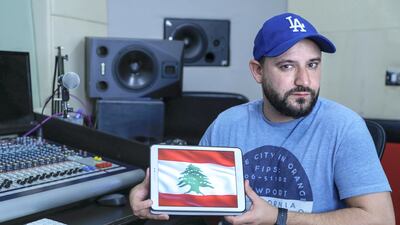Tragedy has inspired an Australian-Lebanese rapper to return to the studio.
After a relatively successful career Down Under with the pioneering Muslim hip-hop group The Brothahood, Jehad Dabab was content to focus on his new career working for a government company when moving to Abu Dhabi in 2016.
However the devastating explosion in Beirut's port on August 4 moved Dabab to reach for the pad and pen once again.
"I wasn't even thinking about writing a song," he tells The National. "Normally, when I am thinking about something in particular or feeling a certain way, I process it by writing about it."
To give some structure and flow to the rhymes, Dabab's late-night writing sessions took place to a slow-tempo hip-hop beat he found online.
When he was satisfied with the material, he recorded his vocals on a mobile phone that night and sent them to fellow Lebanese-Australian producer William Alexander in Melbourne.
By the next day, the demo track to Lebanon, I Love You, was born and Dabab completed the project with a polished version recorded in the Khalidiya studio, Alayam Artistic Production and Media Services.
“The whole thing took four days and I am glad it turned out that way,” he says.
“The whole development of the song had to be direct and immediate. It is a call to action for people to donate to relevant charities.”
The feeling of knowing somewhere deeply that you hardly know at all
As well as raising awareness, Lebanon, I Love You represents an artistic breakthrough for Dabab. With The Brothahood he channelled the alienation that came with growing up as a Muslim-Australian in the wake of 9/11, but Dabab's latest work is his first deep dive into his heritage.
Lebanon, I Love You is extremely personal in that it discusses his complex relationship with the country, a bond that is as deep as it is distant.
This dynamic is all over the lyrics. The verses detail Lebanon's varied history, from being labelled the "Paris of the Middle East" to becoming a land ravaged by civil war and corruption. The hook finds Dabab admitting: "Lebanon, I love you, even though I hardly know you."
This is a feeling that will be familiar to many in the Australian Lebanese diaspora.
"A lot of our parents came from Lebanon to Australia way back in the 1960s and 1970s," he says. "My parents came in that time from Tripoli, so I was born in Australia and went to school there and basically grew up there. When that happens you grow to have an emotional connection with Lebanon without really knowing much about the place."
A desire to reconnect with his roots was a major reason Dabab and his family chose to relocate from Melbourne to Abu Dhabi four years ago.
“It was about being closer to Lebanon, but also to really be immersed in Arab culture,” he says. “I wanted myself and family to come here and improve our Arabic, understand our heritage and be confident about it.”
That message was driven home last year when Dabab and his family travelled to Lebanon. While it may have not been their firstvisit, Dabab described it as trip of a lifetime because this time around he was fully aware of the history and culture the country holds. He was also aware of the deteriorating economic conditions.
“You could have cut the tension with a knife. You can tell that people were desperate and the economy wasn’t going the way they wanted,” he recalls. “So when the explosion happened and I saw all the news footage, it was heart-breaking. I was there and I knew that this situation would just make it worse.”
More music is on the way
While it took a grave event to push Dabab back to the music world, he now intends to pick up where he left off and confirms more tracks are coming.
Recording Lebanon, I Love You, gave him an insight into Abu Dhabi's low-key music scene. "It's interesting in that when it comes to studios a lot of places are bedroom studios and you really have to get out there, go online and ask people to connect you to the right places," he says.
“That’s the thing with the scene here in Abu Dhabi that I found so far. It is like an underground scene in that people are happy to help you if you are prepared to put in the effort.”


